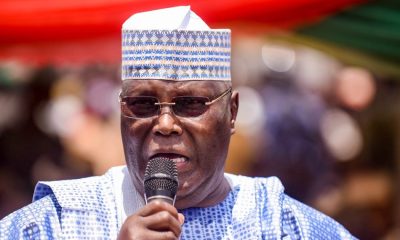NEWS
NIN Registration: Enrollees Seek Extension of Deadline

Residents of Uvwie Local Government Area of Delta have appealed to the Federal Government to extend deadline of registration for the National Identity Number (NIN) to enable all eligible Nigerians to be captured
The applicants also urged the Federal Government to decentralise the process to make it easier for them.
The Federal Government had fixed Feb.
9 as deadline for the NIN registrationMrs Mary Ndoaka said that it would be frustrating for someone to be unregistered at the end of the exercise.
“The stress is too much, It takes a lot of patience for someone to be registered. I have been coming to this venue since last Wednesday.
“Government should extend the deadline because millions of Nigerians are yet to be captured. Government can employ ad hoc staff to make the work easier.
“People are not observing the COVID-19 protocols here because of the stress and pressure to get registered. Nobody wants his or her SIM to be blocked.
“If we really want to adhere to COVID-19 protocols, we should not be gathering here because the crowd is alarming,’’ she said.
Another enrollee, Mr Joseph Aberegbe urged the National Identity Management Commission (NIMC) to create a site for people to enroll online, noting that it would help reduce man-hour and resources.
“The process can be done through the internet and sent to their database for onward processing, rather than crowding people, wasting man-hour and exposing people to the pandemic.
“Some people spend a whole day at the registration centres without achieving anything, so we should think progressively.
“Government should also consider extending the deadline to enable everybody to be registered,’’ he said.
Mr Iyede Wisdom suggested decentralisation of the process to reduce the crowd.
“Government should decentralise the process like that of the voters’ card. The venue is too small to contain this huge crowd,’’ he said.
Mrs Ogbeta Omuan, a 65-year-old woman said that aged persons should be given preference in the registration process.
“They should separate the aged people from the young ones because the stress is too much.
“When I was coming to the venue, the speed of a car almost brought me down on the road.
“My legs are arching me because I have been standing for a long time and I don’t know when it will be my turn,’’ she said.
At the NIMC office in Uvwie Local Government Area, the management ensured that people without nose mask were not allowed to enter the venue
According to Mr Isaac Itobi, the chairman COVID-19 taskforce in Uvwie, anyone who violates the protocols will be apprehended and arraigned in court from Thursday.
A staff of NIMC who craved anonymity said that the process had been simplified to control the crowd that usually thronged the venue.
According to the staff, applicants have been grouped and given dates to come for registration as the gesture will help to manage the crowd. (NAN)
NEWS
Osun HoS, Aina Celebrates Adeleke’s Chief of Staff, Akinleye on Birthday Anniversary

From Ayinde Akintade, Osogbo
Osun State Head of Service, Elder ‘Leye Aina has rejoiced with the Chief of Staff to Governor Ademola Adeleke, Alhaji Kazeem Akinleye, on his birthday today
The Head of Service in his birthday’s congratulatory message to the Chief of Staff and made available to newsmen in Osogbo, the Osun State capital, noted that Alhaji Akinleye is not only a God – given gift to the incumbent administration of Governor Adeleke, he is a complete divine gift to his ancestral home of Edeland because of his laudable contributions.
“Alhaji Akinleye is one of the very few political giants and highly experienced politicians who started his political career from the position of a Ward Councillor and rose to become a Local Government Chairman before his appointment as the Chief of Staff.
“In the history of Osun State, Alhaji Akinleye can be described as the best Chief of Staff so far who is accessible, firm, humane, approachable and ever ready to defend the truth.
“The Chief of Staff’s remarkable qualities, including forthrightness, contentment, courage, genuine friendship and compassion, have made him a beloved figure among his admirers, colleagues and associates.
The Head of Service noted that his heartfelt message includes prayers for Alhaji Akinleye’s continued strength, joy and influence. He prayed that his star will never go dim.
“As I wish you Happy Birthday, long life and prosperity, may the Almighty God never deny you of the reward of your love and sacrifice.
“On behalf of my family, I say Happy Celebration to you, our own Chief of Staff, the Head of Service concluded.
Foreign News
China Tightens Export Rules for Crucial Rare Earths

China has tightened export controls on rare earths and other materials critical for advanced tech manufacturing as trade negotiations continue with the US.
It processes around 90% of the world’s rare earths, which go into everything from solar panels to smartphones – a key bargaining chip ahead of an expected meeting between Chinese leader Xi Jinping and his US counterpart Donald Trump this month.
Beijing had already restricted processing technology and unauthorised overseas co-operation, but Thursday’s announcement formalised the rules.
Foreign companies now need the Chinese government’s approval to export products with even small amounts of rare earths and must explain their intended use.
The ministry announced similar restrictions on the export of lithium batteries and some forms of graphite, which are also essential components in the global tech supply chain and largely produced in China.
Beijing said the regulations are intended to “safeguard national security”. One of the main targets of these controls appears to be overseas defence manufacturers, including those in the US, who rely on rare earths from China.
China had added several rare earths and related material to its export control list in April, as the trade war with Washington ramped up, which caused a major global shortage.
But the new announcement makes clear that licenses are unlikely to be issued to arms manufacturers and certain companies in the chip industry.
Even the technology used to mine and process rare earths, or to make magnets from rare earths, can only be exported with permission from the government, the Commerce Ministry said.
Chinese firms are also banned from working with foreign companies on rare earths without government permission.
The latest announcement also clarifies the specific technologies and processes that are restricted.
These include mining, smelting and separation, magnetic material manufacturing, and recycling rare earths from other resources.
The assembly, debugging, maintenance, repair, and upgrading of production equipment are also prohibited from export without permission, the announcement added.
This could have a major impact in the US, which has a significant rare earths mining industry but lacks processing facilities.
The new regulations create Beijing’s version of US rules which block countries from selling chip-making equipment to China.
The US has used those measures to slow China’s development of powerful chips that could be used for artificial intelligence (AI) with military applications.
Trade expert Alex Capri believes China’s new regulations “are specifically timed” ahead of Xi and Trump’s expected meeting later this month.
Beijing has targeted key vulnerabilities in US electronics and weapons manufacturing, mirroring America’s earlier moves against China’s chip industry, he added.
Rare earths are a group of 17 chemically similar elements that are crucial to the manufacture of many high-tech products.
Most are abundant in nature, but they are known as “rare” because it is very unusual to find them in a pure form, and they are very hazardous to extract.
Although you may not be familiar with the names of these rare earths – like neodymium, yttrium and europium – you will be very familiar with the products that they are used in.
For instance, neodymium is used to make the powerful magnets used in loudspeakers, computer hard drives, electric car motors and jet engines that enable them to be smaller and more efficient.
China has a near monopoly on extracting rare earths as well as on refining them – which is the process of separating them from other minerals.
The International Energy Agency (IEA) estimates that China accounts for about 61% of rare earth production and 92% of their processing.
Foreign News
Madagascar President Asks for One Year to Resolve Problems or Resign

Madagascar’s President Andry Rajoelina has asked for one year to fix the country’s challenges, promising that if they persist, he will resign.
He said this during a town-hall style meeting at his palace with various groups of government supporters. Many attendees had the opportunity to ask the president questions or simply share their views – to which he responded.
“I don’t want flattery.
I want to hear the truth. It’s the people who kept telling me that everything was fine who are responsible for our current situation,” he said.The movement behind the protest, known as Gen Z Mada, has been calling for the president to resign – and rejected an invitation to attend the talks.
They argue that they cannot engage a government that has been repressing them as they demand basic human rights. The group has called for new protests on Thursday.
“We refuse the president’s invitation to talks. We will not engage in dialogue with a regime that represses, assaults, and humiliates its youth in the streets,” they wrote on their Facebook page.
At the expiry of their 48-hour ultimatum for the president to resign, the group called for a nationwide strike, although the details remain unclear.
They have vowed not to back down, urging people from all regions to join them and declaring that “the Malagasy people do not submit”.
Rajoelina has been holding these meetings as part of his pledge to “listen more”, emphasising that the challenges facing the Indian Ocean island nation can only be solved through honest conversations and not protests.
The president assured those at the dialogue that ongoing power projects would address the recurring outages by adding 265 megawatts to the national grid.
“I swear that if power cuts persist in the capital within a year, I will resign,” he said.
The protests began on 25 September triggered by anger over persistent power and water shortages, and have escalated into broader dissatisfaction over corruption, high unemployment and the cost-of-living crisis.
Last week, Rajoelina sacked his entire government and appointed an army general as prime minister on Monday. The protest movement rejected the appointment and vowed to continue their struggle.
Rajoelina came to power in 2009 after leading mass protests that triggered military intervention and overthrew then-President Marc Ravalomanana.
Although the youth-led movement continues to demand his resignation, street protests appear to have weakened.
Life in most parts of the capital, Antananarivo, continues as normal, except in a few neighbourhoods with a heavy police presence, where some roads have been blocked or are being closely monitored.
At least 22 people have died in clashes with security forces and scores more have been injured, according to the United Nations. The authorities have disputed these figures.































